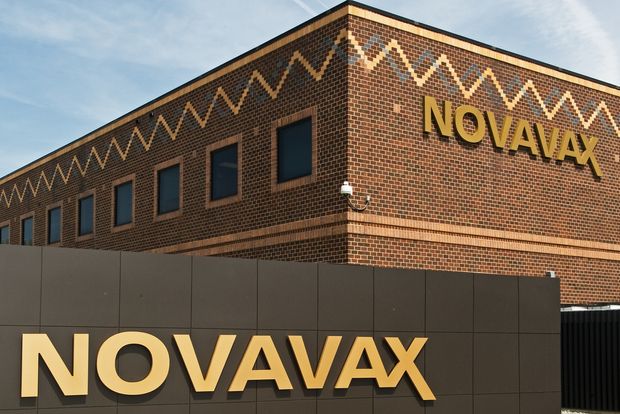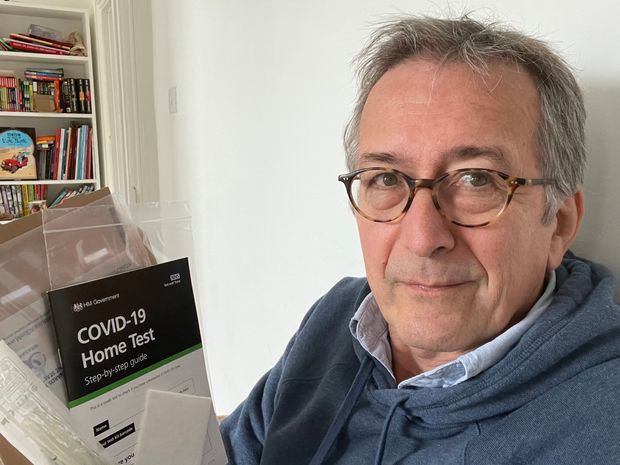
Novavax, headquartered in Rockville, Md., was the second company to enter into a late-stage trial of a COVID vaccine in the U.K.
AFP via Getty Images
The first question that came to my friends’ minds was whether I’d really thought about the possible dangers. Two of them, more focused on worldly matters, asked whether at least I was being paid.
That was a month ago, a few days before I went to London’s Royal Free Hospital to have my first shot as a volunteer in the Phase 3 trial of a coronavirus vaccine. Now the same friends seem to wonder whether I have chosen the right horse, but they don’t venture to ask me, for fear of hurting my feelings.
The vaccine I’m trying is developed by Novavax NVAX, +1.58%, a U.S. biotech company, and it was the second one to be tested in a late-stage trial in the U.K., after the one produced by the collaboration of the University of Oxford and AstraZeneca AZN, +1.75%. A third one, by Johnson & Johnson JNJ, +0.42%, will soon start late-stage trials in the U.K., as well.
But all the news in recent weeks has been on the three vaccines that had reached 90% efficacy or higher in their late-stage trial. No news from Novavax — which is natural because its wide-scale trial started later than the others — so the candidate I have come to consider “my” vaccine, looks like it’s running fourth at best …
In reality, this is all silly. I just received my second shot a few days ago. The answers to all of my friends’ questions are negative. No, I never considered it was risky. No, of course I’m not getting paid. And, as all the experts would tell you, it does make very much sense for Novavax and the dozens of other vaccine candidates to continue with the trials — even if three other vaccines have already shown results, something that was not expected to happen so fast when the world was confronted earlier this year with the calamity of the first coronavirus wave.
It’s not that I want to cheer my team against all odds, as supporters stick with their football club for better and for worse. But ever since I got a phone call asking me to confirm the decision I’d made in early summer to join the register of vaccine volunteers for the NHS, the U.K’s health service, I have, of course, become interested not only in the vaccine but in the fate of the U.S. biotech that is developing it.
So I know that Novavax is based in Maryland, and that the smart move — silly me — would have been to buy its shares in January instead of receiving its vaccine in October. The stock is up 2,200% since the beginning of the year (no, I didn’t throw an extra 0 on that — put differently, the share price has been multiplied by 23). No underdog there, at least. And that’s for a company that is yet to put an actual vaccine on the market.

Pierre Briançon.
The overall reason for the lack of anxiety or “fear of danger,” as my friends would put it, about being inoculated with an unknown substance is that you’re being accompanied most of the way by the NHS doctors and nurses who manage the trial. Everything is explained, options are offered (you can leave whenever you feel like it, without having to give a reason), test kits are distributed if case symptoms occur, and an app is there to keep a daily diary if they do.
Then there’s a monthly “vaccine registry” newsletter, the latest of which insisted that it does make sense to keep researching and trying: Divya Chadha Manek, the head of clinical trials of the U.K. vaccine task force, explained to me (and a few thousand others) first that we will need many vaccines both globally and in the U.K. Second, and this may be even more important, not all vaccines will be found appropriate for all people. “Basically, we can’t put all our eggs in one basket,” Divya wrote.
Besides, this is still, very literally, a trial-and-error process. Three vaccines that seem to have proven their efficacy — from Pfizer PFE, +3.40%, the U.S. pharma group, in collaboration with Germany’s BioNTech BNTX, +5.85% 22UA, -1.72% ; biotech Moderna MRNA, +1.49% ; and the AstraZeneca–Oxford collaborative effort. But questions started being raised about both the process and implementation of AstraZeneca’s Phase 3 trial just a few days after it published its preliminary results. This could mean at the very least that the road to an effective vaccine may be longer and bumpier than hoped for in the optimism of the last two weeks.
So I still root for Novavax, which will take another few months to tell us about the trial result, and just extended its pool of volunteers in the U.K. from 10,000 to 15,000 — even though I may not even be vaccinated at all: Half of us were injected with a placebo, an inactive saline solution looking like a vaccine dose that will have no effect on our immune system. This is a “double blind” trial where even the doctors and nurses following us do not know whether we got the vaccine.
So I’m left wondering, trying not to become a hypochondriac who takes the smallest signs of unease for possible symptoms. Is my left arm hurting after the second shot? Is that a serious headache? And why did I just cough?
Dispatches from a Pandemic: Pope Francis takes aim at anti-mask protesters: ‘They are incapable of moving outside of their own little world’










Add Comment